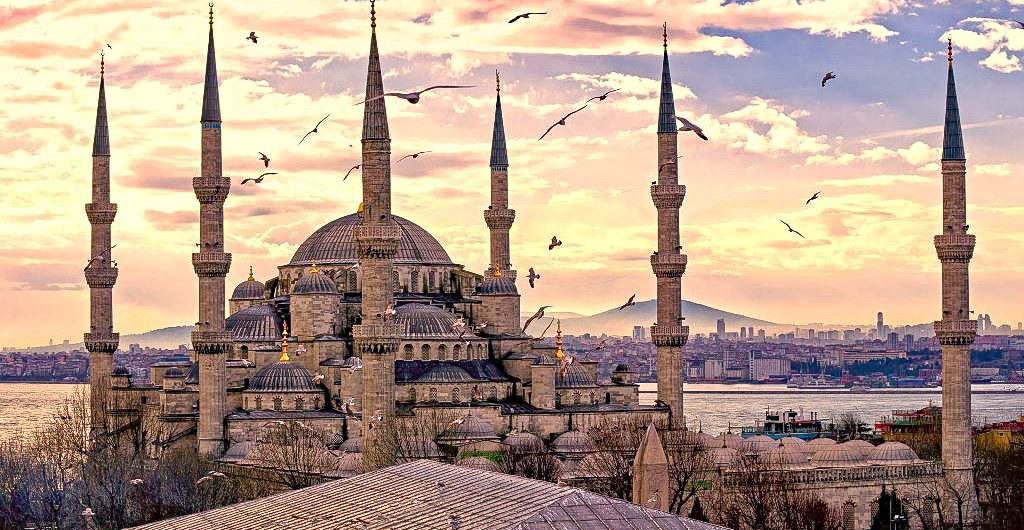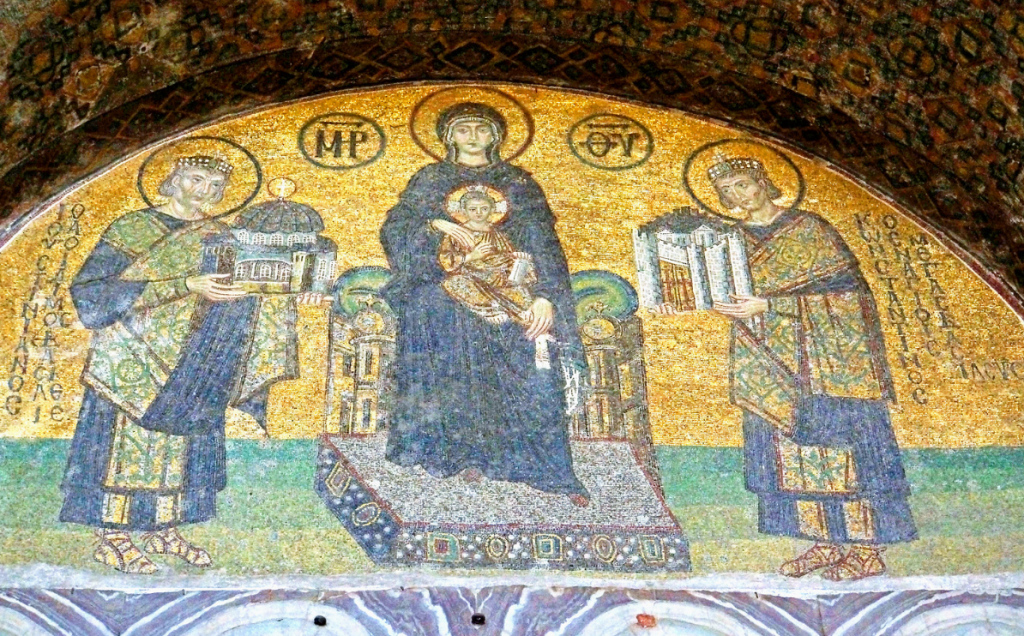What Important Service Did Byzantine Writers Provide To The Rest Of The World?


The Byzantine Empire, is one of the most tragically understudied topics in mod American historical curriculum.
Past Gabriel Johnson
Introduction
Non only did Byzantium achieve greater feats of art and science than Rome, they safeguarded (and advanced) for virtually 1,500 years the ancient knowledge of the Greeks and Romans. Combined with exposure to Islamic and far eastern (India and China) learning and wisdom, the Byzantium Empire was at one signal, the summit of noesis on Earth. Show suggests the European Renaissance was brought nearly an influx of, "Greek," scholars from 1200- 1450. To support this reasoning, three questions should be answered:
- How, when, and why did the ascension and fall of the Byzantine Empire occur?
- How much knowledge was exchanged between the, "East" and "West" leading up to the fall?
- How was the Renaissance influenced by the influx of Byzantine refugees?
Rise of the Empire
In 284 AD Roman Emperor Diocletian divide the Roman Empire into two parts leading to the cosmos of the Western and Eastern Roman Empires. Economic inequality meant that somewhen the Eastern Roman Empire became the seat of ability. In 330 Advertising Emperor Constantine moved the Upper-case letter to his new city in Byzantium,Constantinople.The continual financial burden of propping upward Rome combined with continuous barbarian attacks and infighting would lead to the eventual fall of the Western Roman Empire in 476 Advert. The Eastern Roman Empire would continue as Byzantine Empire for nearly 1,000 more than years. (Gibbon)

Byzantium held great influence for many years. In that location were many attempts to restore the Empire of ancient Rome. None was more successful the Emperor Justinian I who, with his general, Belisarius, managed to take dorsum the whole of Italia and several other of import states. (Spielvogel)

But the confront of the Mediterranean had changed; belongings an empire of that size was also hard to maintain. However, despite setbacks, the Byzantine Empire remained a major regional power until the mid 1200s. (Spielvogel)
Decline of the Empire
The Quaternary Crusade was the first of the end of Byzantium. Civil and religious unrest between, "Greeks and Latins," (Orthodox and Cosmic or western and eastern Europeans) during the early i,200s had erupted into encarmine riots. Matters were further exacerbated by lack of a clear leader (as the Byzantians elected their emperors). Crusaders on their way to the Center E were able to accept advantage of the situation and in 1204 Advertisement, took the City. (Millar)
The resulting massacre (considered unprecedented even in the centre ages) bandage tremendous wounds between the east and west for years to come and permanently weakened Byzantium. (Wikipedia)
Proxy Empires were established in Nicaea and Terbizond just with no clear leader the Empire was effectively expressionless. (Millar)

Eventually, in 1261, Emperor Michael VIII was able to reclaim the city, but the damage had been done. The majority of the final days of the Empire were spent in ceremonious state of war. (Wikipedia)

Led by Sultan Mehmed II, the Ottoman Turks steadily advanced through the remnants of the once mighty Byzantine Empire. Tuckered of wealth and power, outnumber 10 to 1, the last Roman Emperor, Constantine Xi made his stand at Constantinople; his pleas for help largely spurned past the rest of Europe. On May 29th, 1453 Advertizement, after two months of siege the Theodosian walls were breached and Constantinople fell. Stories tell of Constantine Xi donning Roman armor and leading his last few men in one last charge.

Substitution of Cognition
The Greeks and Romans has adult science, math, and philosophy for over a chiliad years. While much wisdom was lost in western Europe due to the barbarian invasions, Greco Roman knowledge remained in Byzantium. (Hartmann) Islamic scientific discipline borrowed from erstwhile Greek learning as well as farther eastern noesis from India.

It was common for Islamic and Byzantian scholars and craftsmen to exchange information. Despite state of war, information technology was not uncommon for Greeks to written report in Byzantium and visa versa. Islamic engineers used Byzantian science to build the Dome of the Stone and Gregory Choniades, a Byzantian, studied and translated Islamic texts on math and astronomy into Greek. (Spielvogel Wikipedia)
While well-nigh Islamic learning fabricated its way to western Europe through Byzantium, Sicily served as another important gateway. The island kindom served as a mutual port for Arab, western, and Greek, traders. This allowed for a blending of cultures known as, Norman-Arab-Byzantian Culture. (Wikipedia)
Byzantine Scientific discipline and Applied science

Domes became a staple of eastern architecture and tin can still exist seen in many modern government buildings around the earth.

Greek fire is a stunning instance of Byzantian chemistry.
The exact makeup is unknown; just it was reported to deed as napalm, sticking to everything and remaining lit even on water.
The Byzantians used Greek fire in several influential naval battles, and to guard Constantinople. (Wiki)
Oft scientific and artistic creativity become manus in hand, and the Byzantians were no exception. They continued the Greco-Roman tradition of stunning (often functional) art.
Byzantine Art and Philosophy

Advanced mosaics fill churches to the brim. and sculptures were fantastically lifelike.
Advances in art, law, and philosophy were made during the Macedonian Renaissance during the Macedonian dynasty founded by Basil the First in 867.
Bans on religious paintings were lifted, trade guilds were established to provide a ameliorate vox to the workers, and additional academies were built. It was time of booming success. (Gibbons)

Byzantian philosophy was rooted both traditional Greek Aristotelian thought besides as Orthodox Christianity.
Law was highly adult from earlier Roman laws and Republican ideas were stiff for well-nigh a millennia; Emperors were elected!
In the 1200s the might of Byzantium had began to turn down and immigrants began to flee to Europe. This included many scholars who would bring accumulated noesis with them. (Hartman)
Byzantine Influence on the Renaissance
Afterwards the sack of Constantinople by the crusaders it was articulate to many Greeks that the empire would not recover. Wave after wave of Byzantians would emigrate to the Christian west; many to Italy due to its close proximity.
Byzantian refugees found fertile ground in Italia. The 1200s were a fourth dimension of relative Italian stability. Furthermore, western Europeans were kickoff to rediscover Greek and Roman writing, there was a renewed interest in philosophy, and cathedrals and castles began to spring up. (Spielvogal)

The spark was already in Italia, merely Byzantian scholars brought the knowledge to lite the rebirth. Advances in every discipline appeared.
A return to the classics atomic number 82 to the philosophy known equally Humanism. Humanism centered on teaching literacy, history, grammar, logic, etc to the denizens.
Questioning was a natural part of the philosophy and an involvement in scientific discipline was renewed as a method to answer questions.
Humanism has an important influence to this 24-hour interval. (Wiki)
Philosophy, Art, and Science

Renaissance art showed tremendous advancement. Intense exercise into 3 dimensional, realistic paintings were conducted and perfected.

St. Peter's Basilica is a stunning example of the culmination of Greco-Roman, Italian, and Byzantian applied science architecture. (Columns, windows, domes)
Conclusion
This prepare out to provide the respond to the questions:
- How did the Byzantine Empire rise and fall?
- What was the exchange of eastern and western knowledge?
- How did this knowledge (brought by refugee scholars) influence the Renaissance?
The Byzantine Empire was a straight continuation of the Roman Empire. It was exiled during the fourth cause in 1204 and destroyed by the Ottoman Empire in 1453. Because of its heritage, Byzantium was able to go along and develop upon the philosophy and science of the Greeks creating marvelous works of law, art, and engineering. Furthermore due to the close proximity of the empire to the Arab states likewise every bit merchandise with Sicily, boosted schools of thought were able to exist in Byzantium, adding to its culture and assuasive for several smaller Eastern Renaissances (The Macedonian Renaissance and the Renaissance of the twelfth Century). Finally, due to the weakening of the Empire from the Latin unrest, the sacking of Constantinople, and its eventual fall, Byzantian (Greek) scholars fled, mainly to Italian republic. This rapid reintroduction of knowledge came at a fourth dimension when Europe was first to yearn for learning and kicked off the Renaissance, impacting the world to this twenty-four hour period.
Citations
- Byzantines in Renaissance Italy. (north.d.). Retrieved from https://world wide web.the-orb.net/encyclop/late/laterbyz/harris-ren.html/
- Gibbon, E. (1776). History of the Decline and Autumn of the Roman Empire.
- Gilles, & Jo, Eastward. (2006, August 15). Immigration and Identity in the Middle Ages : French Immigrants to … Retrieved from https://journals.openedition.org/cem/418
- Greek scholars in the Renaissance. (2018, October 23). Retrieved from https://en.wikipedia.org/wiki/Greek_scholars_in_the_Renaissance
- History of the Byzantine Empire. (2018, October nineteen). Retrieved from https://en.wikipedia.org/wiki/History_of_the_Byzantine_Empire
- Miller, W. (1908). The Latins in the Levant: A history of Frankish Greece (1204-1566). London: Murray.
- Spielvogel, J. J. (2008). Western culture: A brief history: Comprehensive volume. Belmont, CA: Thomson/Wadsworth.
- Hartmann, H., & Wittje, R. (n.d.). Islamic Science and the Making of the European Renaissance. Retrieved from https://mitpress.mit.edu/books/islamic-science-and-making-european-renaissance
- Norman, Arab, Byzantine Culture (2018, October 11). Retrieved from https://en.wikipedia.org/wiki/Norman-Arab-Byzantine_culture
Originally published by ESRI, Fall 2018, republished with permission for ecuational, non-commercial purposes.
Comments
What Important Service Did Byzantine Writers Provide To The Rest Of The World?,
Source: https://brewminate.com/the-fall-of-the-byzantine-empire-and-rise-of-the-renaissance/
Posted by: goodwinbutenway.blogspot.com


0 Response to "What Important Service Did Byzantine Writers Provide To The Rest Of The World?"
Post a Comment